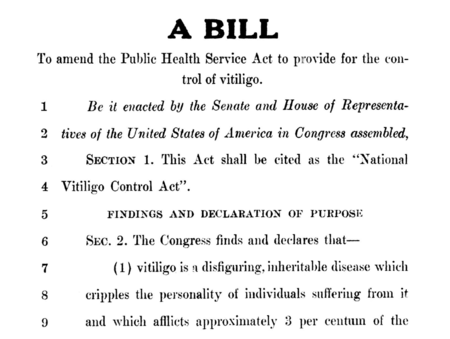New
An official copy of the proposed 'National Vitiligo Control Act' from 1975
We have officially received a copy of the National Vitiligo Control Act, introduced in bills H.R. 5264 (1975) and H.R. 3520 (1977). Both were championed by Maryland Congressman Parren J. Mitchell, who personally battled vitiligo. This legislation sought to amend the Public Health Service Act to fund research and public education on vitiligo but, unfortunately, failed to advance.
The legislative journey began with H.R. 5264, introduced on March 20, 1975, during the 94th Congress. Mitchell reintroduced it as H.R. 3520 on February 16, 1977, during the 95th Congress, where it garnered bipartisan support from 12 Democrats and three Republicans but ultimately did not pass. Mitchell—a trailblazer in civil rights and the first Black congressman from Maryland—was known for his relentless advocacy for marginalized communities.
Now is the time for action! We’re calling on the vitiligo community to join forces and work toward reintroducing this historic bill.
Download your copy.

FAQOther Questions
- Which is better for judging vitiligo — Wood’s lamp or dermoscopy?
A recent study out of India compared the two head-to-head. Both tools correlated fairly well with clinical criteria, but dermoscopy had a slight edge: Wood’s lamp: sensitivit...
- What causes vitiligo?
Surprisingly, the causes of vitiligo are yet to be precisely established. Researchers know the cause is pre-wired in your genes, just waiting for a bad luck moment. In about hal...
- Pyrostegia venusta as a folk medicine for vitiligo?
Pyrostegia venusta, also known as “flame vine” or “cipó-de-são-joão,” is a neotropical evergreen vine native to Brazil. It thrives in fields, coastal areas, forest edges, and ro...
Though it is not always easy to treat vitiligo, there is much to be gained by clearly understanding the diagnosis, the future implications, treatment options and their outcomes.
Many people deal with vitiligo while remaining in the public eye, maintaining a positive outlook, and having a successful career.
Copyright (C) Bodolóczki JúliaBy taking a little time to fill in the anonymous questionnaire, you can help researchers better understand and fight vitiligo.
